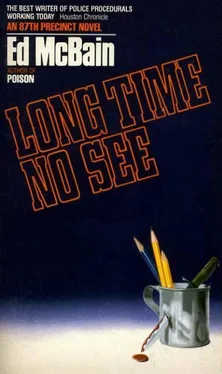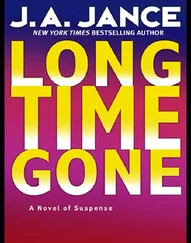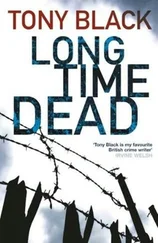The tempo of the city was changing.
From the dreary four/four of the workaday week, it was moving into a swifter beat, a quarter note played with the speed of an eighth, a sixteenth flashing by like a thirty-second — this was Friday night and the weekend was ahead. On the island of Isola, uptown and down, the citizens poured out of subway kiosks, heading for hot baths and fresh threads. In Riverhead, Calm’s Point and Majesta, the public transportation system was mostly aboveground, the elevated structures winding above the city streets with all the grace of poor planning, steel supporting-pillars embedded in concrete that was wedded to cobblestones that went back to the turn of the century. The elevated tracks and elevated platforms created a landscape of eternal shade below. The graffiti-sprayed subway cars came up out of their underground tunnels and clattered along the tracks toward distant destinations; to someone who lived at the other end of Riverhead, the farthest station stop in Calm’s Point was a two-hour-and-ten-minute ride away. You could get to Paris on the Concorde in just a little while longer. Here in Diamondback, the tracks were underground, and the only ugliness to be seen was in the tenements that lined the avenues and streets.
Diamondback was black, and black is beautiful — but Diamondback wasn’t. The blacks coming up out of those subway kiosks worked in a variety of jobs during the day, most of them menial. Many of the women cleaned house for other women, soaping fine china and polishing heavy sterling, dusting furniture bought abroad in French and English antique shops, hanging custom-designed dresses in closets where sables and minks nuzzled side by side, rinsing out crystal champagne glasses, and putting into the garbage outside the kitchen door empty magnum bottles with labels they could not pronounce. Some of the men worked in the kitchens of restaurants, washing dishes or sweeping floors, fetching or carrying while in the dining rooms out front the patrons ordered pâté de fois gras or filet mignon à la Béarnaise. Some of the men were responsible for keeping the garment industry going, pushing racks of clothes from dress house to dress house in the teeming area below Kerry Cross, weaving in and out of traffic with the skill of toreadors dodging bulls. The cabs they avoided and eluded as they pushed their wheeled wardrobes were largely driven by black men like themselves, who carried wealthy passengers to luxurious apartment buildings on terraces overlooking the River Dix, where black women worked washing fine china and polishing heavy sterling, the cycle repeating itself ad infinitum.
The building in which Sophie Harris lived was a far cry from the river-view apartments on the city’s south side, an even farther cry from the cloistered private homes in Smoke Rise, hugging the city’s other shore. There was no doorman here; there was not even a door. Someone had removed it from its hinges, leaving only the gaping jamb, beyond which was an entrance alcove. The alcove was a five-by-eight cubicle with a row of mailboxes on its left. They found a nameplate for Sophie Harris, pressed the bell under her name, and went to the inner-lobby door, which was still there though badly scarred with names in hearts. They did not expect an answering buzz, and got none. In Diamondback, the locks on most lobby doors had been broken when there were still Indians running in the forests, and the landlords hadn’t bothered to replace them. Instead, the tenants fortified their own apartment doors with enough locks to keep out an army of thieves. A man who got to be forty and still wasn’t his own best doctor was a man who needed a doctor. And a man who lived in Diamondback for more than forty minutes without becoming an expert locksmith was a man who needed his apartment burglarized.
The stink of piss hit them the moment they opened the inner-lobby door. Carella backed away from it as if struck in the face with a slops bucket. Meyer said, “Phhhh,” and hurried toward the stairs. A radio blared from behind a door on the first-floor landing, the disc jockey’s rapid-fire shpiel riding in over the rock-and-roll beat as he extolled the merits of a skin cream. On the second floor a scrawny calico cat was sitting in the hallway. She looked at the detectives warily, as though she were a burglary suspect. There were cooking smells and all the smells of living in the building, combining to render the nostrils numb. They knocked on the door to Sophie Harris’ apartment.
A woman said, “Who is it?”
“Detective Meyer,” Meyer said. “We spoke on the phone just a little while ago.”
They heard the locks being undone. First the deadbolt, then the Fox lock, its heavy buttress bar thudding to the floor as she lowered it. The door opened.
“Come in,” she said.
As they stepped into the apartment, Carella wondered what the majority of black people in the United States of America felt when they were watching black people portrayed on television. Did they think Golly, that ’ s me? If they lived in a Diamondback apartment — where the first thing you saw upon entering was the exposed and rat-gnawed electrical wiring over the sink — did they think what they saw on television was an accurate portrayal of their own human condition? Or did those blacks cavorting on the small screen symbolize for them the hope of America? Could their own problems be one day reduced to the mindless sitcom chatter that flowed into their own living rooms, where overhead leaking pipes bloated the ceiling and would continue to do so till the plaster caved in, despite repeated phone calls to the landlord (who was white) and to the Department of Health (which didn’t give a damn)?
Sophie Harris was a woman in her late forties. She might have been a beauty when she was younger — her complexion was a warm chocolate brown, her eyes an amber the color of a cat’s, she was still slender and tall — but the burden of living in the non-television black world had stooped her shoulders and grayed her hair, lined her face and reduced the timbre of her voice to a hoarse whisper further weighted by the tragedy of the recent murders. She apologized at once for the appearance of the apartment — it seemed spotlessly clean to both Carella and Meyer — and then offered the detectives something to drink. Whiskey? Tea? There might be a little wine in the refrigerator — anything? The detectives declined. Outside the living-room window, where they sat beneath the bloated and threatening ceiling, the neon sign of the bar across the street flickered against the curtainless night. There was the sound of an ambulance siren someplace — in this city, there was always the sound of sirens.
“Mrs. Harris,” Carella said, “there are some questions we’d like to ask about your son and daughter-in—”
“Yes, certainly,” she said. “I’ll try to assist you as best I can.”
She was adopting the kind of formal speech many blacks used with whites, especially when the whites were in a position of authority. It was phony and fake, it denied the ethnicity that the phony and fake television sitcom shows simulated so well. To television-watchers, the sitcom shows were real. Never mind this shitty apartment in Diamondback. Whatever they saw on the tube was the reality. The real Depression family was the one on television, forget your own father who struggled along on five bucks a week in 1932. The television doctors were real, the television cops were real, everything on television was real except science fiction, and even that was more real than the moon shots.
So here they sat. Two real cops and a real black woman. One of the cops was Italian, but he didn’t wear a dirty raincoat, and he didn’t fumble for words and he didn’t pretend he was dumb. The other cop was bald, but he didn’t suck lollipops and he didn’t shave his pate clean and he didn’t dress like the mayor. The black woman wasn’t married to a man who owned a string of drycleaning stores, and she wasn’t dressed as if she were going to Bingo. She was embarrassed by the presence of the two men because they were white — even though her own daughter-in-law had been white. And she was intimidated by them because they were cops. All three sat there in real and uncomfortable proximity because someone real had murdered two other people. Otherwise, they might never have met each other in their entire lives. That was something television missed — the purely accidental nature of life itself. In televisionland, everything had a reason, everyone had a motive. Only cops knew that even Sherlock Holmes was total bullshit, and that all too often a knife in the back was put there senselessly. They were here to learn whether there’d indeed been a motive; they would not have been surprised to learn there hadn’t been the shred of one.
Читать дальше












